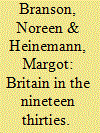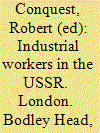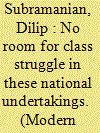| Srl | Item |
| 1 |
ID:
024568


|
|
|
|
|
| Publication |
London, WeidenFeld and Nicolson, 1971.
|
| Description |
x, 358p.Hbk
|
| Standard Number |
297002775
|
|
|
|
|
|
|
|
|
|
|
|
Copies: C:1/I:0,R:0,Q:0
Circulation
| Accession# | Call# | Current Location | Status | Policy | Location |
| 007091 | 941.082/BRA 007091 | Main | On Shelf | General | |
|
|
|
|
| 2 |
ID:
026570


|
|
|
|
|
| Publication |
London, Bodley Head, 1967.
|
| Description |
203p.
|
| Series |
Soviet Studies Series
|
|
|
|
|
|
|
|
|
|
|
|
Copies: C:1/I:0,R:0,Q:0
Circulation
| Accession# | Call# | Current Location | Status | Policy | Location |
| 000095 | 331.7940947/CON 000095 | Main | On Shelf | General | |
|
|
|
|
| 3 |
ID:
140941


|
|
|
|
|
| Summary/Abstract |
Independent India's new state-owned infrastructural industries were not only entrusted with the mission of producing essential public commodities, but they were also required to promote the economic and social advancement of their workforces. To achieve this objective, big public enterprises in particular, helped by the financial power they derived from their control over the strategic sectors of the domestic economy, established generously endowed welfare programmes. This article argues that such a developmental ideology shaping managerial policy orientations is central to understanding why accepted explanations for the rationale of employer-sponsored social benefits are insufficient when it comes to studying similar initiatives in the Indian public sector. To substantiate its argument, the article explores the provisioning of social needs over a period of roughly half a century (1948–2002) at a large state-run producer of telecommunications equipment, Indian Telephone Industries. The welfare regime as it evolved here boasted one unique feature: it rested on dual foundations, with both the company and the trade union assuming independent responsibility for the well-being of employees. A range of informal self-help schemes devised by workers further supplemented the institutionalized social security net set up by the management and the union. The article also discusses how the firm sought to scale back its largesse in the aftermath of economic liberalization.
|
|
|
|
|
|
|
|
|
|
|
|
|
|
|
|